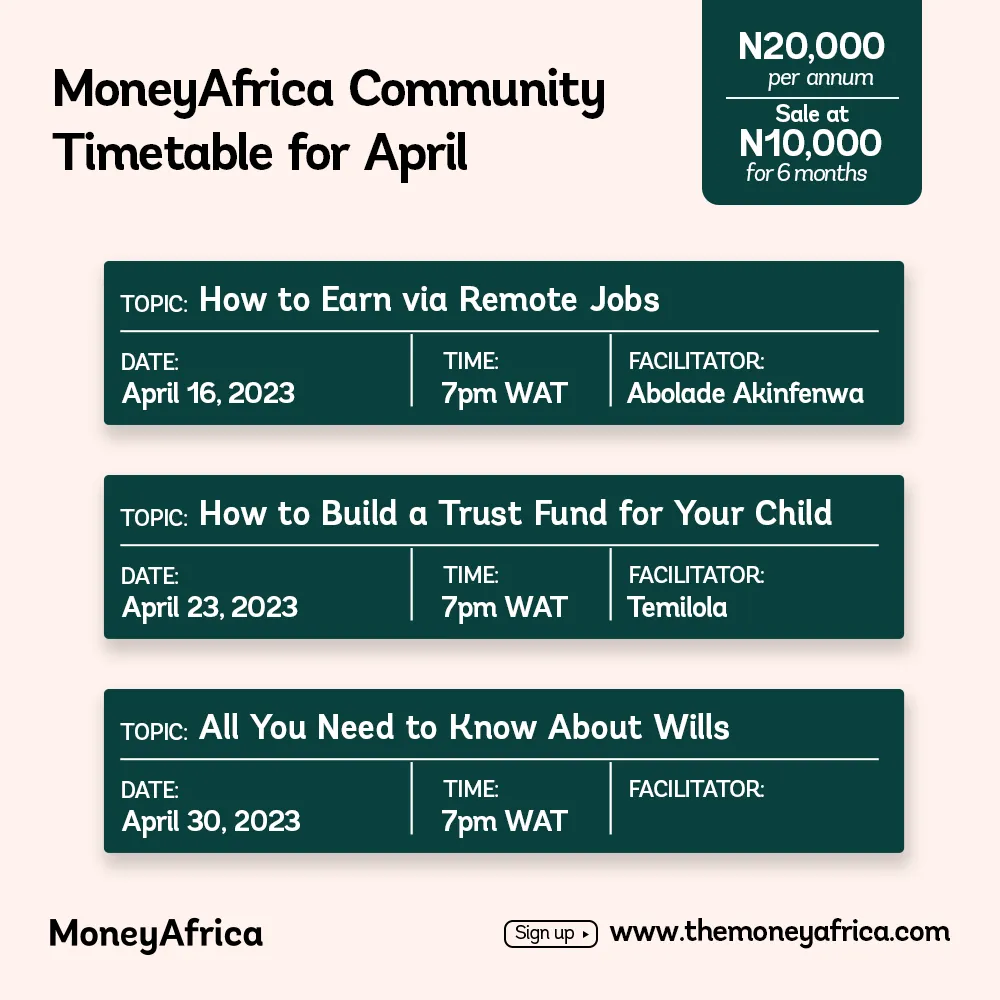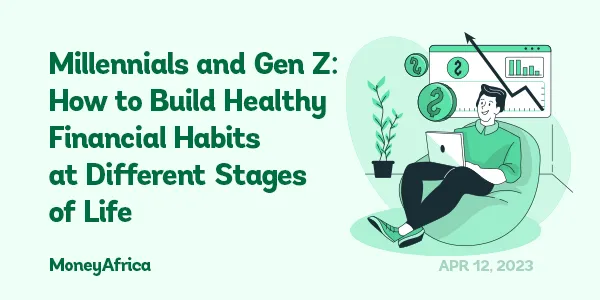Good Morning 😃
How are you doing?
I was on a call recently with a Gen Z, and contrary to the excitement most of my Gen Z clients usually have when I start talking about investing, this particular client was not excited. She earns quite well, lives with her parents, enjoys free rides to the office, has health insurance coverage, and bonus packages. So, she literally has no business with huge spending.
But the moment I brought up the discussion on investing for retirement, she said, “I am still young for that. I’m not ready to do any “long thing.” So I asked her what she would be using her money for. She responded, “To look good, hang out, get a new car, and all.” Although I was surprised, I really couldn’t blame her. Most young people who are earning so well these days are confused on what to do with their money.
At this point, you’ll need to grab a seat and learn how you should manage your money at different stages of your life.
Investing and financial planning are crucial components of building long-term wealth and financial security. However, as we go through different stages of life, our investment strategies and priorities may shift significantly. This can be attributed to changes in our income, expenses, risk tolerance, and overall financial goals.
In this article, we’ll explore how your approach to investing and finance may change at different stages of life and then offer some tips on how to adapt your investment strategy to meet your changing needs.
Starting out (ages 18–25):
This is the period when you have recently graduated from university or have started working and having disposable income. For people in this category, their income is usually higher than their expenses, as some of them live with their parents, even though others may consider getting their own accommodation.
Since you have no business with huge spending like those in the other generations, now is a good time to build healthy financial habits if you have not started.
Your focus should be on:
- Creating a budget and sticking to it.
- Saving and investing regularly.
- Investing in yourself by adding to your skills or getting more professional certifications.
When you start early, you can set yourself up for a bright financial future and achieve your long-term financial goals.
Early career (ages 25–35):
This is the stage when most people start thinking of settling down and building a family. If this happens, the financial system would be altered, as you’ll start thinking of your partner, having children or sending your children to school. Your choice of life partner also becomes a major factor in how you handle your finances.
So what should be your focus at this stage?
Since you’ve established good financial habits at the starting out age, it’s important to focus on increasing your income and thinking of long-term savings goals such as buying a home or saving for retirement.
Here are other key things to focus on at this stage:
- Set up an education trust fund for your children.
- Buy land and or get a mortgage.
- Get health insurance, especially if you’re in the motherhood stage.
- Get life insurance.
- Plan for retirement and invest in bonds, stocks, ETFs and other investment options.
- Create multiple streams of income—side hustle, business, coaching, digital products, etc.
- Invest in yourself, invest in your education or pursue career advancement opportunities.
Mid-career (ages 35–50):
At this stage, you should have a solid foundation of financial habits and be on your way to achieving your long-term savings goals. It’s important to continue investing in your career, as well as your retirement savings. This may also be a good time to start thinking about additional investments such as real estate or stocks. Besides, you should reduce excessive spending on eating-out and start to eat home-cooked food, exercise regularly, reduce spending on aso-ebi, and get a health and life insurance plan.
Late career (ages 50+):
As you approach retirement, it’s important to focus on maximising your savings and minimising debts. This may mean downsizing your home or reducing your expenses to free up additional funds for savings. You should also start thinking about how you’ll manage your retirement income by investing in fixed assets, managing your pensions, or other financial assets.
If you’re over 50 and have not yet secured a health and life insurance plan, it’s not too late. In fact, it’s more important than ever to have these types of insurance as you approach retirement age. Health insurance can provide coverage for unexpected medical expenses, which can quickly add up and cause financial strain.
Life insurance can also provide peace of mind, knowing that your loved ones will be financially protected in the event of your unexpected passing. This can help cover funeral expenses, outstanding debts, and provide a financial cushion for your family.
Estate planning is another crucial thing to consider at this age. Without a will, your assets will be distributed according to state laws, which may not align with your wishes. This could also cause unnecessary stress and conflict among your loved ones.
Some additional tips for building healthy financial habits include:
- Tracking your spending: This can help you identify areas where you may be overspending and where you can cut back.
- Building an emergency fund: Having a cushion of savings can help you avoid relying on loans in case of unexpected expenses or job loss.
- Avoiding lifestyle inflation: As your income increases, it’s important to avoid the temptation to increase your spending. Instead, try to maintain your current lifestyle and put the extra money towards savings or investments.
- Building healthy financial habits require discipline, consistency and a willingness to prioritise long-term financial goals over short-term gratification.
Thank you for reading Money Africa’s Blog.
Please feel free to share it.
Do you have any questions? You can send an e-mail to info@themoneyafrica.com or send a DM to any of our social media channels.
***
MoneyAfrica premium plan
Are you a mid to high-income earner? Do you find communities a bit too busy? You should sign up for our premium plan.

You can learn more about that here.
***
We often get questions regarding how to plan your finances to align with your relocation plans, especially for students seeking to further their studies. As always, we have heard you, and we have put together an e-book to help you navigate this. Follow this link, to get your FREE copy of the e-book: The Japa Encyclopedia.
***
Get our annual subscription and learn more about investing safely and building a solid portfolio in 2023.

Don’t forget to:
- Join our community, if you want to smash your 2023 financial goals. It takes at least 30 days to build great habits that will last you a lifetime. So why not start now? There is a lot you can achieve.
- If you would like to document your financial journey in 2023, then our journal would be an excellent fit for you. It costs ₦7,500 (excluding delivery).
- Get a budget sheet to track your monthly expenses. Click here
- Get an investment tracker to be on top of all your investments. Click here
MoneyAfrica is a financial literacy platform. Our goal is to make everyone better with their finances.
We do this by engagements via our:
– social media handles
– platforms for paid community members (for adults and students)
– webinar sessions with corporate clients
Would you like to join any of the communities? Please click here
Would you like us to hold a webinar for your company? Please send an email to info@themoneyafrica.com


